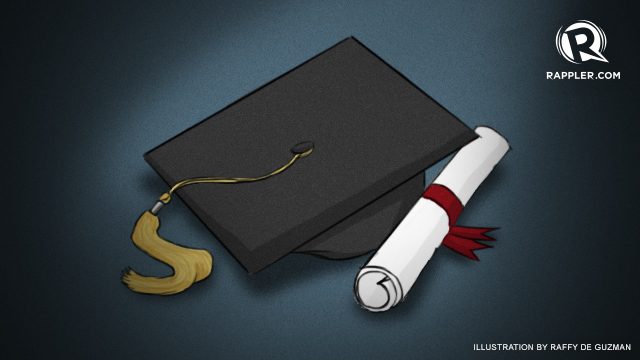SUMMARY
This is AI generated summarization, which may have errors. For context, always refer to the full article.

As a young woman nearing 22 years of age, I am fortunate to have graduated from high school and to be able to attend one of the best universities in Australia free of tuition fees. I know for certain that there are students around the world who take their tertiary education for granted. Up until now, I would’ve considered myself one of them.
Different attitudes toward education
I was recently having lunch with a fellow Rappler intern with whom I was describing university life in Australia. As a fee-paying Filipino university student, he was shocked when I told him about some students who throw parties or plan weeklong vacations during SWOTVAC (Study Without Teaching Vacation – an entire week allocated for students to study and revise before the end-of-semester examinations) as opposed to doing what they are supposed to be doing.
I’m not going to lie. I have been guilty of this, too, and I feel ashamed for admitting that.
Moreover, I shocked another group of Rappler staff by telling them that I have friends (a majority of whom are males) who simply aim for a pass grade of 50% in their subjects. Just last semester, during the stressful end of the exam period, one of my friends told me to “relax” and that everything will be fine as long as I pass. I realized now that this is a ridiculous attitude to have when there are students around the world who have to pay up-front tuition fees every semester or who have courses that require a higher percentage grade to pass. It’s almost offensive.

Easier for some, harder for others
I’ve heard and read about the admirable struggles of hard-working Filipino students who have had a difficult time graduating due to the expenses of tertiary education. I was not aware of this until I read the touching article by Rappler’s Raisa Serafica and her ordeals as a UP undergrad. Generally speaking, the current and former Filipino students that I’ve met take their studies very seriously, possibly more seriously than many of my fellow Australian students back home.
I’m no professional education trend analyst, but I suspect that the uneven outputs of effort correlate with the costs of tertiary fees, if any, that a student is required to pay.
From my own observations, I’ve concluded that students who pay tuition fees tend to have more at risk as opposed to those who don’t. By risk I am referring to the potential disappointment of sacrificial parents or the wasting of hard-earned money if a student misses the mark. Perhaps, their parents or they themselves have had to work jobs that pay minimum wage to fund their studies or they’ve had to study to the extreme in order to receive a scholarship. These people appreciate the monetary and labour-intensive value of education. (READ about the 5 leaps in 2013 that make Philippine education promising.)
Abusing state-funded tertiary education
Compared to the tedious queues for loans and ‘stacks of required documents’ that Filipino students have to endure, the only thing Australian students are required to do is to provide their tax file number (TFN) on their online university database which students manage on their own.
Tasks such as enrollment into degrees, deferment, managing personal details, course selection as well as changing degrees are conducted online as Australians tend to have an aversion for waiting in queues.
If we decide to quit our studies altogether, we just have to click the “terminate” button and walk away from the computer. Already you can see how students can easily take advantage of the system.
And then there are student loans.
I’m not sure if Filipino’s are aware of this, but in Australia students attending public universities (more than 90%) don’t pay up front fees. We have a loan system known as Higher Education Contribution Scheme (HECS), by which students, regardless of their parents’ income, are eligible to defer the payment of tuition fees until they earn over AUD $30,000 (approximately PHP 1.2 million) in yearly income. If they do earn over this threshold then the government, through tax, deducts a certain percentage from a person’s weekly income until they are debt free.
Tertiary students are also eligible to receive fortnightly pensions from the government in the form of rent and income assistance (as many students don’t live with their parents) as well as (up to) AUD$1000 textbook bonus (PHP 40,000) at the beginning of each semester to cover the costs of textbooks.
This may sound like a perfect circumstance, and for those who take full advantage, it is. For others, however, not being accountable for the cost of their education results in laziness and contempt. Not everyone spends his or her government-provided money wisely.
I know people (Australian, French, German) who have changed degrees multiple times, who defer their studies for up to 2 years to backpack around the world or who, once graduated, work as waiters or supermarket cashiers to avoid paying back fees.
It makes me wonder why someone would go through years of tertiary study to just throw it away?
Despite this downside of state funded education, however, I see it as the better system as it provides the opportunity for people with the ‘brains’ to attend university who would otherwise be financially unable to. I have a close friend of mine who just graduated with a law degree and who will start her masters in environmental engineering this year. She grew up in impoverished circumstances due to domestic trouble. Who knows what would’ve become of her and others in similar situations if we didn’t have HECS.
Let’s not forget internships
Internships are integral to education as regular attendance to lectures is. Some students aren’t eligible to graduate without having completed a minimum set of hours. Unlike some of my fellow communications classmates at university, my uncle isn’t the CEO of a leading Australian television channel or my mother’s cousin isn’t editor-in-chief of a famous lifestyle publication.
Despite having the advantages of being a citizen of a country that offers financial assistance to students, I’ve had to exert persistent effort in order to obtain an internship, much to the annoyance of some.
I’ve realised that internships provide more than just industry-related knowledge; they give undergraduates lessons in networking, social interactions and worldly experience. Yet for some, the costs of partaking in one are just as demanding as their school fees. (By costs, I am referring to the out-of-pocket expenses such as transport and/or equipment, or the time needed to take off paid employment to intern.)
The value of my Rappler internship
During my internship with Rappler, I have appreciated every opportunity that has come my way and have no doubt been exposed to many new and valuable experiences. My exposure in Manila to poverty, teenage mothers, street children and hearing the inspirational story of Rags2Riches co-owner Reese Fernandez at TEDxADMU have given me an overwhelming feeling of gratitude for what I have. The latter proving that no matter how difficult the circumstances, anything is still possible. (READ: Culture shock: Does it matter if you’re brown or white?)
This internship has made me aware that education of the self and of others is a very powerful tool for social, economic and political change – whether it be by informing readers about the Reproductive Health Bill or providing external links on where people can donate goods for typhoon Yolanda victims.
Unfortunately, in a country such as in Australia, many students see education as merely a mandatory burden to please their parents rather than as a step for making a difference in society.
Education is something that cannot be bought and sold at will. It’s something that will stay with us forever along with the valuable experiences we encounter. I have no doubt that my experiences in Rappler will. – Rappler.com
Maria Grippo is a Rappler intern and a student based in Australia. Follow her at @oppirGairaM.
Add a comment
How does this make you feel?
There are no comments yet. Add your comment to start the conversation.